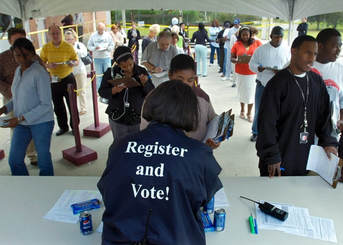|
3/22/2018 Why we need public election fundsYou wouldn’t expect Pizza Hut to pay for a McDonald’s hiring event. So why do voters expect special interest groups to pay for the longest and most important job interviews: candidates for elected office?Opinion Piece by Cristi Demnowicz, RepMD Chair  Lately, there has been a lot of talk about running government like a business. If so, we the people are both the “employers” and “clients” of anyone who finds themselves in the role of an elected lawmaker. But when a candidate “applies” for this job, we the people do little to support them. Most voters do not feel that it’s their responsibility to do so, or worse, that government is something that happens “over there”, away from their daily life. Nothing could be further from the truth. Beyond declaring important principles of the new Country of the United States, our founding fathers were not very forward thinking. They did not create any guidelines on how our candidatorial system would be funded. Why would they? To qualify for elected office, you had to be a white male landowner, which implied wealth and the ability to cover your own expenses. For years after, both elections and the voter base stayed small (white males only) and candidates didn’t need to cover a lot of geographic space to win enough votes. There was no such thing as TV or internet ads and getting press coverage was much simpler. Unfortunately this is no longer the case. In fact, a number of 2016 elections cost more than the GDP of some small countries. As elections tactics have changed, they’ve outgrown the expectations of our countries founders, so lawmakers, the two main parties, and political power players have been making solutions up as they go. Passage of the Civil Service Reform Act in 1883 established that positions within the federal government should be awarded on the basis of merit instead of political affiliation and prohibited compulsory contributions from job appointees to the political party that got them their job. However, as an unexpected consequence, the Democratic and Republican parties, who took over funding campaigns after the civil war, no longer had the guaranteed income to do so. This opened the door for corporations, special interest groups and wealthy individuals to fill the void. In a world where money is as important above all else, it’s perfectly natural for someone who spends a lot on a campaign to expect special considerations in return. In the years following, a lot was done to regulate how much and how often “big money” and special interest groups could donate to candidates, including passing the Tillman Act in 1901 and the Bipartisan Campaign Reform Act in 2002. The former never applied to Maryland and the latter was later gutted in a number of Supreme Court cases including McConnell V FEC and Citizens United V FEC. Now, almost all winning candidate campaigns are funded by specific types big money groups: corporations or corporate PACS, private foundations & non profits, and unions & professional associations (both are bundlers). And these groups have found creative ways to bypass any remaining campaign finance laws including creating shell corporations to funnel dark money and relying on superPACs, which have no contribution limits, to do the bulk of the work. What’s worse, there is a lawsuit in the pipeline to SCOTUS that would eliminate campaign contribution limits entirely. If decided in favor of the plaintiff, and without a different option for candidates who truly want to represent the people, the decision would be the last nail in the coffin for regular people being considered when making public policy. If we the people are both the clients and employers of elected officials, then WE must be the ones to pay for their campaigns. Public Election Funds are the solution. These funds will have positive monetary and symbolic consequences on democracy. Because they are required to collect a certain number of small donations in order to qualify for matching funds, candidates will spend more time doing creative grassroots campaigning, instead of pandering to big money groups. This will lead to more transparency and a better rapport between voters and elected officials. By deciding to use the pubic fund, candidates telling voters that they’ll work for them, not special interests. Maryland must pass statewide public election funds for all state and local elected offices. It’s the best way for our current leadership to do what our founding fathers didn’t: ensure democracy for future generations. |
Archives
October 2020
CategoriesAll Action Alert Annapolis MD Baltimore County Big Banks Candidate Endorsment Corruption DNC Scandal Drugs Elections EPA FCC Federal Nonsense Get Big Money Out Greenbelt MD Imran Awan Maryland Politics Military Money Laundering Monsanto Net Neutrality President Trump Prison For Profit Public Election Funds Puerto Rico Represent Maryland Sexual Harrasment Sinclair Broadcasting Small Money Certification Takoma Park MD Tax Payer Money Trump Volunteer Spotlight Voter Suppression Wall Street Week In Review |
|
© COPYRIGHT 2020 ALL RIGHTS RESERVED.
Paid for by Represent Maryland PAC. Authorized by B Tabatabai, Treasurer Not affiliated with any candidates, campaigns or parties. |


 RSS Feed
RSS Feed